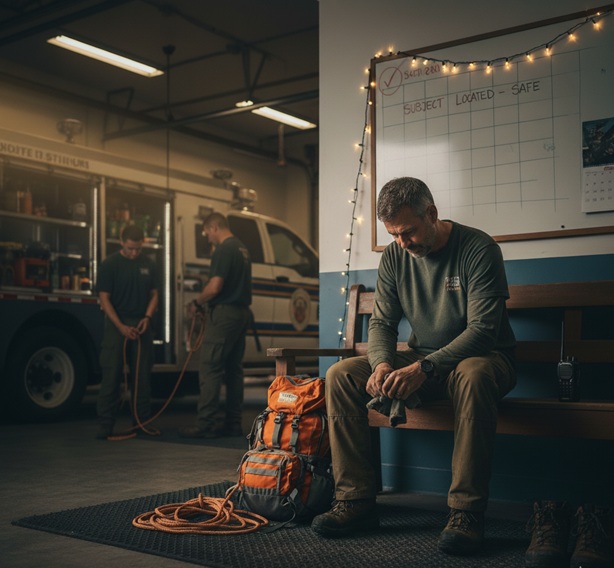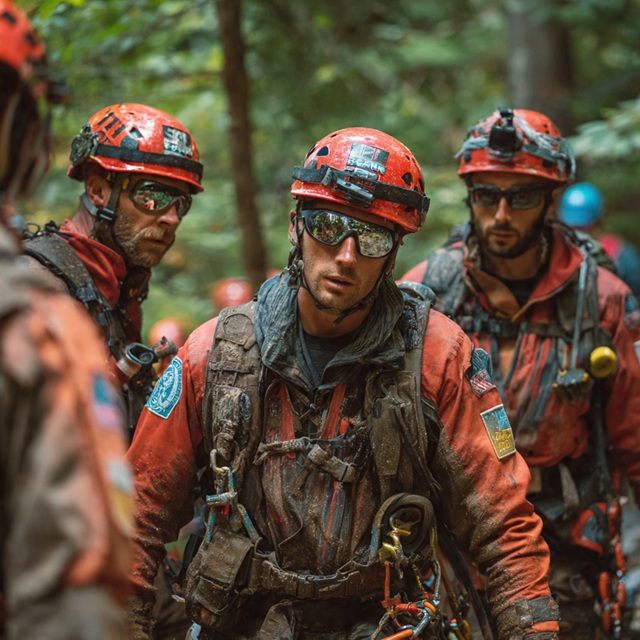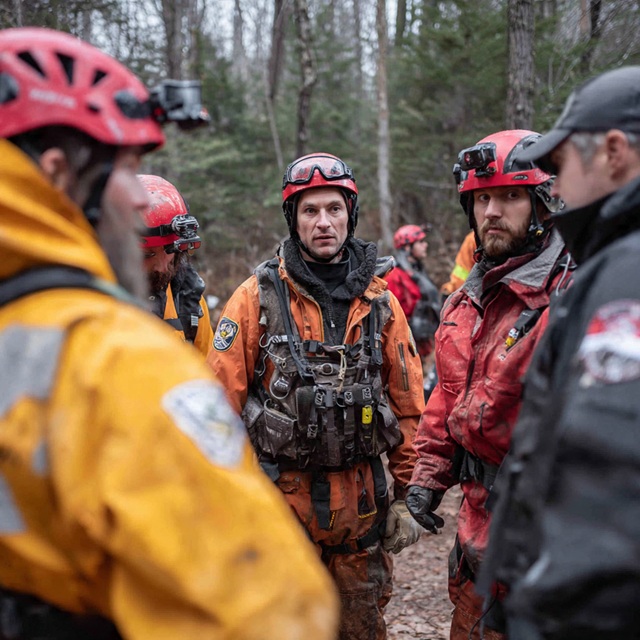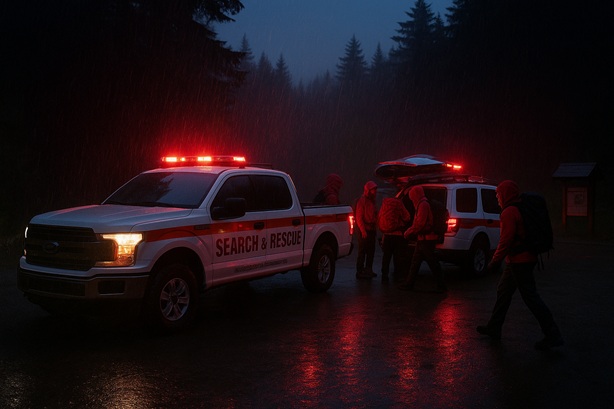The Calm After a Search
The quiet always feels good. The search is over. The headlamps are off.
When the radios go silent and the trucks pull back into the bay, there’s a moment of stillness, a pause between one story ending and the next beginning. The gear is muddy, the packs are heavy and everyone’s tired. But there’s comfort in that quiet hum of shared effort. It’s a stillness that feels like a deep breath out, a collective sigh of relief when everyone makes it home.

Getting gear cleaned up and ready for the next call is part of the ritual, scrubbing mud from boots, coiling ropes, hanging harnesses to dry. It’s both a reset and a reflection. While the work is physical, the silence afterward is emotional. You think about what went right, what could have gone differently and the people you served, whether they were found safe or not.
That quiet moment isn’t about celebration. It’s about gratitude for teammates who showed up, for the chance to help and for the knowledge that when the next call comes, someone will answer. This quiet time isn’t just about readiness. It’s an involuntary moment of emotional reflection. It’s when we process the mission, the relief that broke the tension and the heavy awareness of what we just helped prevent.
The “Why” — Not the “What”
Why does a team of strangers, all volunteers, drop everything to run toward someone else’s crisis? It’s not built on adrenaline or a desire for heroics. It is built on a simple foundational belief: everyone deserves to come home.
It’s easy to think of search and rescue as dramatic or dangerous and sometimes it is. But at its core, it’s about people quietly showing up when someone else is lost, injured or afraid. It’s about the community’s strength when ordinary people choose to help, where compassion, not adrenaline, drives the response.

It’s the result of countless small decisions: the decision to show up to a training session, to spend a Friday night practicing rope techniques or sharpening medical skills or perfecting navigation and the unwavering decision to answer that late-night page. It is an expression of compassion and connection that extends beyond the immediate scene.
There’s no fame in this work. There’s no spotlight. There’s just a pager tone in the night and the decision to respond again and again, because someone out there needs help. It’s about people stepping up to help strangers in their worst moments. Search and rescue shows up because, at the core of it, we are all neighbors and we all understand what it means to face the worst day imaginable.
The truth is, SAR isn’t about heroics. It’s about heart. It’s about preparedness, compassion and connection. It’s about the small, steady choices: training on your day off, maintaining your gear, checking weather, learning terrain, building trust with your team. Those choices don’t make headlines, but they make rescues possible.
The Bigger Picture
And while compassion drives us, coordination sustains us. No search happens in a vacuum and no success belongs to a single person. Search and rescue is an essential thread in the vast woven fabric of emergency response.
A successful outcome is a testament to trust and teamwork built over years. Search and rescue teams are part of something bigger, a network of responders who rely on one another’s strength, skill and coordination. Every mission begins with the dispatchers who calmly take the frantic initial call, law enforcement who secure the scene, fire and EMS who provide critical care and neighboring search and rescue teams who willingly cross county lines in the dark of the night to augment manpower without hesitation.

Behind every successful rescue are the volunteers who shouldered the miles, the canines that tracked through the darkness and the ground crews who checked every possible path. It is a system reliant on professionals and volunteers alike, that proves that teamwork is the only true source of strength when a life is on the line. Teamwork and trust aren’t just words. They’re lifelines. Every successful rescue depends on communication, collaboration and mutual respect across agencies.
And when it’s over, the same people who spent hours in the cold and the dark return to their regular lives as parents, students, engineers, nurses, store clerks, all carrying the weight and the meaning of what they just did quietly, with pride that’s rooted not in ego, but in service.
A Call to Action Rooted in Gratitude
If you see a responder today, on National First Responders Day, thank them, not just for what they do, but for why they do it.
But the best way to honor them isn’t just with words, it’s with action. The most powerful way you can support the mission is to be part of the prevention effort. Take a moment to prepare before your next outing. Check the weather. Tell someone your plans. Pack the ten essentials. Charge your phone. Bring what you need to stay safe.
Search and rescue teams exist because bad things happen to good people, but preparedness can drastically change the outcome. Every life we save starts with someone who thought ahead. If you want to make an even bigger difference, consider volunteering, donating or sharing safety information in your community. Because the more we prevent, the fewer rescues we need.
Help us keep the quiet moments, the moments of successful reflection, sacred. #TakeTheExtraMinute because rescue starts long before the call ever goes out. Every first responder is grateful for the opportunity to serve.

Discover more from Tales of Many Things
Subscribe to get the latest posts sent to your email.
